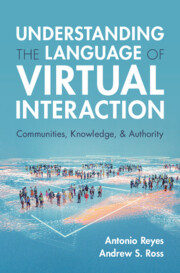Book contents
- Understanding the Language of Virtual Interaction
- Understanding the Language of Virtual Interaction
- Copyright page
- Contents
- Figures
- Tables
- 1 Introduction
- 2 Web 2, a Digital Revolution?
- 3 Digital Communication and the “Post-Truth” Era
- 4 The Formation of Virtual Communities
- 5 The Negotiation of Meaning, Knowledge, and Authority Online
- 6 (De)Legitimization of Authority in Digital Communication
- 7 Competition with Official Institutions
- 8 Politics and Participation in the Digital Public Sphere
- 9 Human Rights and Social Change in Virtual Spaces
- 10 Discourse and Identity in a Lawless Digital Universe
- 11 Conclusion
- References
- Index
10 - Discourse and Identity in a Lawless Digital Universe
Published online by Cambridge University Press: 05 September 2025
- Understanding the Language of Virtual Interaction
- Understanding the Language of Virtual Interaction
- Copyright page
- Contents
- Figures
- Tables
- 1 Introduction
- 2 Web 2, a Digital Revolution?
- 3 Digital Communication and the “Post-Truth” Era
- 4 The Formation of Virtual Communities
- 5 The Negotiation of Meaning, Knowledge, and Authority Online
- 6 (De)Legitimization of Authority in Digital Communication
- 7 Competition with Official Institutions
- 8 Politics and Participation in the Digital Public Sphere
- 9 Human Rights and Social Change in Virtual Spaces
- 10 Discourse and Identity in a Lawless Digital Universe
- 11 Conclusion
- References
- Index
Summary
This chapter addresses the legal challenges of the virtual world, with a particular emphasis on the role of identity in its new configurations in the contemporary virtual environment. Specifically, we consider the changing nature of regulation, law and crime in an online context that has seen the emergence of the metaverse, which has made connecting the physical with the virtual persona more complex. Avatars and other personae have made it challenging to align identity with prior understandings and perceptions. Digital personae and virtual representations of selves require theoretical reconsiderations of identity and a set of norms that regulate interaction, and human relations in general within this world. Indeed, a discussion on identity rationalizes the need for new laws. The chapter considers these emerging challenges and explores the role that democratic governments and other gatekeepers can play in regulating digital communication and discourse, balancing the protection of freedom of speech with the persecution of hate speech. The perceived state of lawlessness that inhabits the online space suggests the need for clear criteria and terms of use, in addition to establishing a mechanism of accountability for those involved in virtual crimes, due to the lack of governmental guidelines for crimes in virtual universes.
Information
- Type
- Chapter
- Information
- Understanding the Language of Virtual InteractionCommunities, Knowledge, and Authority, pp. 153 - 169Publisher: Cambridge University PressPrint publication year: 2025
Accessibility standard: WCAG 2.2 AAA
Why this information is here
This section outlines the accessibility features of this content - including support for screen readers, full keyboard navigation and high-contrast display options. This may not be relevant for you.Accessibility Information
Content Navigation
Allows you to navigate directly to chapters, sections, or non‐text items through a linked table of contents, reducing the need for extensive scrolling.
Provides an interactive index, letting you go straight to where a term or subject appears in the text without manual searching.
Reading Order & Textual Equivalents
You will encounter all content (including footnotes, captions, etc.) in a clear, sequential flow, making it easier to follow with assistive tools like screen readers.
You get concise descriptions (for images, charts, or media clips), ensuring you do not miss crucial information when visual or audio elements are not accessible.
You get more than just short alt text: you have comprehensive text equivalents, transcripts, captions, or audio descriptions for substantial non‐text content, which is especially helpful for complex visuals or multimedia.
Visual Accessibility
You will still understand key ideas or prompts without relying solely on colour, which is especially helpful if you have colour vision deficiencies.
You benefit from high‐contrast text, which improves legibility if you have low vision or if you are reading in less‐than‐ideal lighting conditions.
